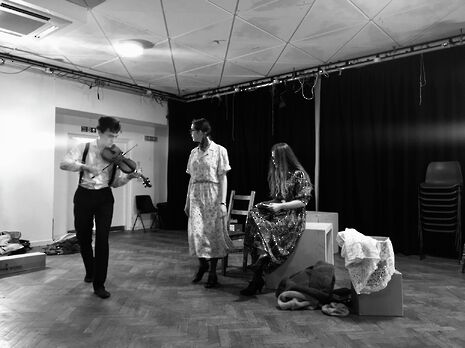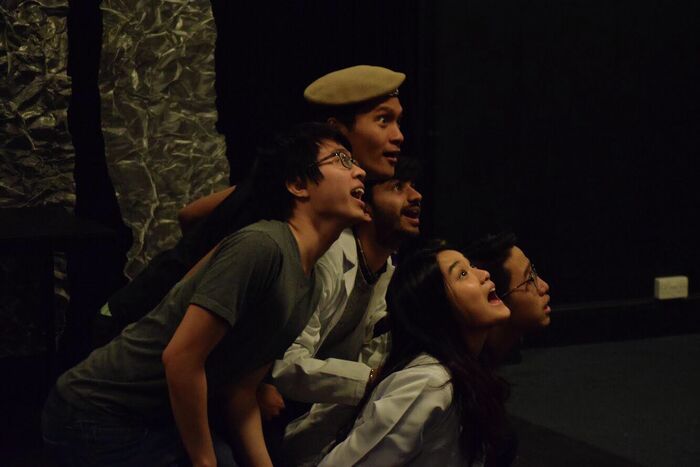Kindertransport preview
Kindertransport looks to be a sensitive, fascinating, and highly relevant piece of theatre, writes Hope Whitehead

The cast of the Pembroke Freshers’ Play, Diane Samuels’ Kindertransport, are in the midst of rehearsing a scene when I walk in. Evelyn (Izzie Glover) and her daughter Faith (Agnelle Groombridge) argue over her past. ‘Whatever it is that you think you have discovered, you must forget it’, says Evelyn, who was once Jewish refugee Eva, and whose life story is a mystery to Faith for much of the play. This is a show that is interested in mother and daughter relationships, so it’s fitting that this is the point that I get to see rehearsed. Director Piper Whitehead says this is something she has tried to draw out as she and the cast bring this piece to life: she tells me that ‘at its heart, this play is about these relationships, in their different forms and complexities’. Izzie Glover echoes this in describing what it’s like to play Evelyn: ‘the interplay between the three generations of women’ is a crucial part of the character, and for Glover, opened up a ‘level of vulnerability between Evelyn and her mum, whereas a harshness mereged in scenes with Evelyn and her daughter, Faith’.
"At its heart, this play is about these relationships, in their different forms and complexities"
Kindertransport’s subject is the evacuation of around ten thousand children in the months leading up to World War II, through the eyes of Jewish refugee Eva. The play explores the extreme displacement of these children in scenes where German and English intermingle – Eva’s English becomes less accented throughout the play, but the scene where she meets Lil (Sejal Karmakar) is one of an intense cultural divide. Lil, says Karmakar, ‘plays a pivotal role in Eva’s life and helps her become the strong woman and mother she is as Evelyn, whilst supporting her through thick and thin. The thing I’ve enjoyed the most about playing the role of Lil is her time jumps throughout the play and portraying her vibrant personality, as well as her somewhat questionable parenting’. We are asked to consider parenting from the point of view of Eva’s mother Helga (Izzy May), from that of Lil, and from Eva herself – the play is invested in what it means to be a mother as much as it is interested in what it means to be a daughter.
Kindertransport’s cast is almost entirely female, which Whitehead says creates an interesting dynamic. While our focus is drawn to the female relationships, it’s impossible to forget the driving force of the external action – the male-dominated context of the second World War. Whitehead notes how ‘the only male figure in the play represents these external, masculine forces behind the war, even as he moves between different characters’. The single male character, ominously referred to as the ‘Ratcatcher’ and played by Benjamin Gibson, multiroles as both the Ratcatcher figure, and every male character in the play. Whitehead describes the Ratcatcher as ‘the embodiment of Evelyn’s anxiety and past trauma, which is omnipresent in the play’. Omnipresence in Whitehead’s direction (and Samuels’ writing) is never without meaning – the Ratcatcher multi-roles throughout the text, so is frequently present on stage, just as the figure of Young Eva haunts Evelyn’s life by frequently being part of the background of her scenes. Glover describes Evelyn as ‘preoccupied with maintaining outward appearances to hide inner trauma’, and says it has been ‘really interesting’ to explore ‘what happens when she is forced to confront everything she has sought to cover up’.
Young Eva’s presence on stage, frequently at the same time as her older self, for Whitehead, hints at the continuous threat of exposure for Evelyn, the constant struggle with her identity that plays out with Faith’s insistent desire to know about what she describes as her ‘context’. The blocking is deliberately ‘representative of how Evelyn has attempted to compartmentalise herself into two different people’, but also emblematic of how this fails: ‘her old self always maintains its presence, leaving a constant risk of being revealed’.
Kindertransport was first performed in 1993, and has been produced fairly regularly ever since, but Whitehead’s not worried about it seeming overdone. In 2019, she says it has special resonance with contemporary refugee crises, that ‘in many ways the global situation is today is more similar to that time than any other since. Refugees are pouring over the borders in Syria and Myanmar, and many of them face the same kind of discrimination that Jewish refugees did, despite the fact that our knowledge should be informed by this history.’ Most of us, she says, would like to believe that had we been alive in 1938, we would have been among the ‘understanding few’, but Whitehead highlights a ‘disconnect’ between the way we might imagine we might have acted then, and how we act towards the refugees of today. Kindertransport looks to be a highly relevant piece of theatre for 2019.
 News / Downing investigates ‘mysterious’ underground burial vault 29 December 2025
News / Downing investigates ‘mysterious’ underground burial vault 29 December 2025 News / Unions protest handling of redundancies at Epidemiology Unit30 December 2025
News / Unions protest handling of redundancies at Epidemiology Unit30 December 2025 Lifestyle / Ask Auntie Alice29 December 2025
Lifestyle / Ask Auntie Alice29 December 2025 Features / ‘Treated like we’re incompetent’: ents officers on college micromanagement30 December 2025
Features / ‘Treated like we’re incompetent’: ents officers on college micromanagement30 December 2025 Science / Astronomical events to look out for over the break29 December 2025
Science / Astronomical events to look out for over the break29 December 2025










